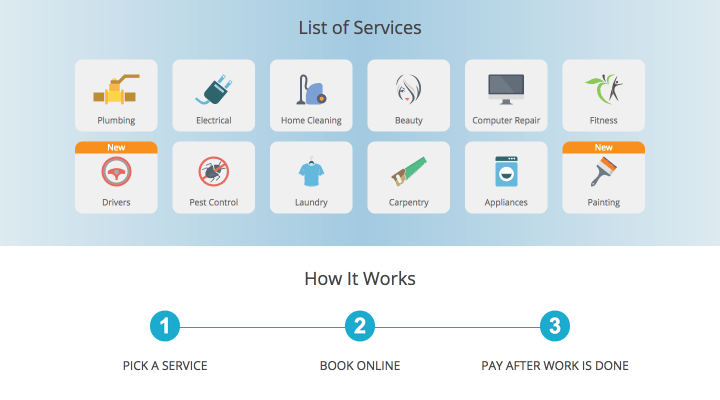Amazon has led a $23 million investment in India-based Housejoy, a startup that — as the name not-so-subtly suggests — is much like Homejoy, the home services on-demand company that closed its doors this summer. The U.S. e-commerce giant was joined in the Series A round by existing investor Matrix Partners, and new backers Vertex Ventures, Qualcomm and Ru-Net Technology Partners.
Unlike U.S.-based Homejoy — which had raised nearly $40 million and was the most visible player in an emerging category — Housejoy offers more than just home cleaning services. It caters to plumbing, electrical/appliance repairs, beauty, fitness, laundry and pest control and more.
The startup is less than a year old, it previously raised $4 million, and is currently available in 11 cities across India. With this new funding, CEO Saran Chatterjee told TechCrunch that it plans to expand to cover 25 cities by the end of next year.
The involvement of Amazon, which previously invested in India-based deals with financial comparison service BankBazaar and gift card startup QwikCilver, is interesting.
Its founder Jeff Bezos hasn’t been shy in admitting that the company is very much focused on growing in India, where it launched two years ago and is rivaled by two home-grown unicorns: SoftBank-backed Flipkart and Alibaba-backed Snapdeal. Last year, Amazon invested $2 billion in its India business and results seem to be going its way after it recently claimed to have beaten its well-backed rivals on monthly traffic for the first time.
Chatterjee stressed in an interview that Amazon hasn’t discussed acquiring Housejoy, and that its involvement in the round could unlock a lucrative partnership for the startup.
“Amazon has come in as a financial investor [which offers] potential [partnership] opportunities,” Chatterjee explained in an interview. “Amazon is very particular about its fulfillment — furniture, home appliances, phones, etc — which have a very specific experience. While they are selling the product, we can take care of the fulfillment experience, such as furniture installation and ongoing maintenance.”
So, in short, Amazon could promote Housejoy as a service partner to its growing customer base in India, but Chatterjee confirmed that this is “not an automatic choice.”
“We have to earn [a partnership] by demonstrating that we can offer that high quality of service,” he added.
Beyond its expansion, Housejoy plans to use the money to ramp its quality assurance protocols which evaluate and assess the ‘service providers’ who work for the company. In that way, it’s very much like Uber — a marketplace through which independent workers can find jobs. With some customers experiencing issues with the service — including one India-based writer at Tech In Asia — Chatterjee admits that it needs to raise its reliability from (probably) a seven out of ten score, to nine or ten.
The company is also planning to spend a portion of its funding on strategic acquisitions. Chatterjee said that around 10 percent of the round — so roughly $2 million — could go towards buying up companies or acquihiring teams that “give us a position of strength in a city or category, or [add to the] team and talent.”
